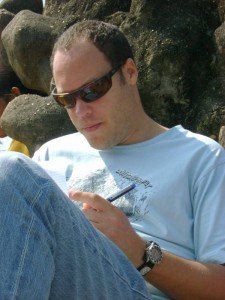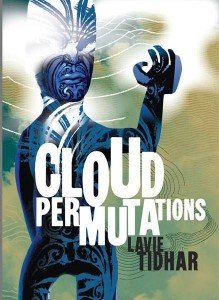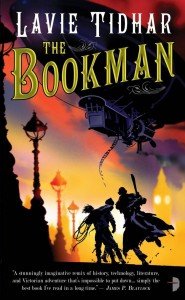Lavie Tidhar is an Israeli born writer who travelled extensively over the globe and lived in places like Laos and Vanutau. He writes poetry (“Remnants of God”), and published many short stories in magazines such as Strange Horizons, Clarkesworld Magazine, Postscripts, Interzone and others. He also published a novella, “An Occupation of Angels”, a collection of short stories, “HebrewPunk”, a short novel in collaboration with Nir Yaniv, “The Tel Aviv Dossier”, and he also edited a non-fiction book, “Michael Marshall Smith: The Annotated Bibliography”, and two anthologies, “A Dick & Jane Primer for Adults” and “The Apex Book of World SF”. Lavie Tidhar’s first novel, “The Bookman”, was released by Angry Robot Books in January this year. He was the winner, in 2003, of the first Clarke-Bradbury International Science Fiction Competition sponsored by the European Space Agency and, in 2005, was a Writers of the Future finalist. He was nominated for an Israeli Geffen Award in 2006 and again in 2010.
 SFmag: In Hungary we don’t know much about Hebrew speculative fiction. Could you tell me a few words about its history and also what are the strongest influences you had from Hebrew SF?
SFmag: In Hungary we don’t know much about Hebrew speculative fiction. Could you tell me a few words about its history and also what are the strongest influences you had from Hebrew SF?
Lavie Tidhar: There has never been much Hebrew SF – and most of what was published was children’s books. The best was probably a three book series by Eli Sagi, The Adventures of Captain Yuno (Sagi went on to become a successful playwright and TV writer), which were the adventures of two children on board a spaceship travelling across the solar system, and the aliens they met on each planet… This would have been in the fifties, though, and most people would never have heard of it. In the 80s the first serious SF magazine was launched, Fantasia 2000, and it also Hebrew short stories alongside the translated ones – one of the people to publish an early story there was Amir Gutfreund, who became well-known later for novels such as Our Holocaust. An interesting contributor, incidentally, was Victor Ostrovsky, who apparently drew some of the magazine’s distinctive covers – and later became more famous as a renegade Mossad agent…
To my mind, the two best stories published in the magazine were by a writer called Mordechai Sasson, who wrote about a future Israel where robotic beggars lived in the street. It had a lot of influence on some of my writing, with that image recurring in my forthcoming novel Martian Sands, as well as in some of the short stories.
It was only in the late 90s that SF really expanded in Israel, with a new generation of fans, and the advent of the Internet. Now there are web sites, one very large convention and several small ones, even a magazine (at some point there were three – a record). There are both fan writers, mainly writing short stories, and novelists, though the two don’t seem to share much common ground. Writing mostly in English, I’m afraid I don’t fall into either category…
SFmag: You write both in English and Hebrew. How does language affect the theme, style or mood of the stories? In what language do you usually read fiction?
Lavie Tidhar: As I mention above, I write mostly in English. Not exclusively – I wrote several short stories in Hebrew, most of which I also translated into English later – and one novel, a humorous murder mystery set in an Israeli science fiction convention, with my friend Nir (we also wrote one English novel, The Tel Aviv Dossier, together).
I also tend to read mainly in English, but to be honest, where I’ve been the past three years (Vanuatu, Laos…) I didn’t have much access to books period. You end up reading whatever’s there, and not necessarily what you might have wanted.
SFmag: You were born in Israel, you lived in South Africa, the UK, the South Pacific and South East Asia, and you still travel a lot. How much do you let other cultures influence you and are you actively seeking experiences that can be transformed into stories?
 Lavie Tidhar: Well, obviously I find living in different places, experiencing different cultures, very beneficial. I’m a magpie, in a way, stealing and borrowing from where I am at the time. I grew tired of reading the same futures every time, the same American futures – I also remain unconvinced that the future will be American. I find South East Asia a great environment for setting sort of cyberpunk stories in. Each place has its own influences – my latest novella, Cloud Permutations, is based on my experience in Vanuatu, in the South Pacific, very strongly, and I have one Vanuatu novel sitting on my hard drive at the moment. The book I’m currently working on is set mostly in Africa… the world’s a big place, and the future belongs to everyone in it. Doesn’t it?
Lavie Tidhar: Well, obviously I find living in different places, experiencing different cultures, very beneficial. I’m a magpie, in a way, stealing and borrowing from where I am at the time. I grew tired of reading the same futures every time, the same American futures – I also remain unconvinced that the future will be American. I find South East Asia a great environment for setting sort of cyberpunk stories in. Each place has its own influences – my latest novella, Cloud Permutations, is based on my experience in Vanuatu, in the South Pacific, very strongly, and I have one Vanuatu novel sitting on my hard drive at the moment. The book I’m currently working on is set mostly in Africa… the world’s a big place, and the future belongs to everyone in it. Doesn’t it?
SFmag: How are you able to find time for writing as you seem to lead an intensive life?
Lavie Tidhar: I think it’s closer to the truth to say I lead a very boring life in interesting places. I’m lucky that I’m able to travel – which mostly has my wife to thank for! – but also being stubborn enough – stupid enough, if you prefer – to insist on writing as opposed to, say, making enough money to buy bread or pay rent… I guess not caring about the things most people care about – getting a mortgage, buying a car, that sort of thing – helps. Or maybe it’s me who needs help… I don’t even have a mobile phone.
SFmag: You write poetry, nonfiction, short and long fiction, a play and comic strips. „Mr. Spellman’s Holiday”, a comic strip was published not long ago in Murky Depths. How did you find working together with an artist?
Lavie Tidhar: I love it. I absolutely love visualising something and have it come to life out of a script. I have no artistic talent whatsoever so it’s always amazing to me to see. I’m working with a British artist, Paul Mccaffrey, at the moment on a weird picture book called Going to the Moon (about a boy with Tourette’s syndrome!) and his artwork just blows me away. I’m also working on a Mr. Spellman graphic novel, with Indonesian artist Andre Siregar, about a Holocaust-surviving ventriloquist… there are some other projects in the works too.
SFmag: One of your stories, „Transylvania Mission” has Hungarian references. Where did the idea come from and did you have help with the Hungarian words?
Lavie Tidhar: Well, my family is Hungarian, in fact – my grandparents come from Transylvania, and I grew up with Hungarian being spoken (though I can’t speak it myself!) and a lot of references to Transylvania. I still have some relatives in Budapest, as it happens. My grandfather’s cousin, Erdélyi Lajos, who is quite a well known photographer, is still there. When I was eighteen I travelled through Romania and Hungary – this would have been early 90s – so I got a chance to go to Braşov and Vásárhely / Târgu Mureş, where my grandfather grew up, and to Budapest. I really should go back soon…
What it comes down to, basically, is that I tend to not make stuff up if I can help it! And I seem to return a lot to family history, the Holocaust, the war… it shaped my childhood in many ways – stories of the Carpathian mountains, the snow and the bears, the frozen rivers – and then, at the same time, the knowledge of what happened to those who stayed behind.
“Transylvanian Mission” is quite a light story – I was trying to re-imagine pulp fiction, in a way, with just a different take on it – but I go back to this source again and again in different ways. I hope one day to write a sort of three-generational family history novel, starting with my grandfather’s story. I’m not sure I’m ready yet though…
SFmag: You are not only a writer but edit anthologies as well. Can you tell me a few words about what drove you to collect short stories from all over the world into Apex Book of World SF?
Lavie Tidhar: Intense masochism? Editing is hard work – like herding reluctant cats all into the same bag. I guess it’s a mixture of idealism and – no, scratch that, just raw idealism! God knows no one was planning on making money out of something like this, though to my surprise the anthology actually did quite well! The fact is, anthologies like this have only ever been done before by American or British writers/editors – every decade or two, say – never from the point of view of someone from outside of that world. It was brewing in my mind for years before I got to actually do it – and by then I’ve known enough people – writers and editors from around the world – to make it a pleasure looking for stories.
And the response has been great! Good enough to convince the publisher to let me do a second volume. We got a lot of exposure, saw a lot of debate that’s still continuing – I don’t know if we started it or just rode on the tip of the wave, but either way it’s tremendously satisfying.
SFmag: What is your opinion on the visibility of world SF? What obstacles has a non-English speaking writer to come over?
Lavie Tidhar: I think English readers will never be a huge market for translation. I’d love to be proven wrong. Crime fiction in translation does do very well, so maybe science fiction will follow at some point. Publishers like Gollancz in the UK are pushing translated novels (from French and Russian so far). I also think a lot of people are making a conscious shift to write in English, in order to reach a wider market. It was part of my decision to write in English, after all. I think India – where English is, of course, one of the official languages – is going to become a much bigger player – it’s already putting out some great novelists but I think we’ll also see a lot more SF coming from there in the coming years.
In any case, I try to showcase as much of the global SF scene as I can – whether with the anthology, or the blog, or simply by talking about it to whoever wants to listen. Luckily, too, other people are doing that, so as long as we can keep the conversation going, everyone’s going to benefit, I think.
SFmag: Together with Charles Tan you edit the World SF News Blog, a great source for speculative fiction from all over the world. How did you start the project and what are your plans for the future?
Lavie Tidhar: It sort of started as a promotional tool for the anthology, though it took on a life of its own very quickly. I roped in Charles to help – now I don’t know how I would have done it without him. It started off just linking to things, now we have regular original features – essays and articles from different people – we run editorials, interviews, as well as publishing news and links to other web sites with material of interest. I keep experimenting with it – most recently we’ve started publishing some fiction, for instance, and done a movie week, which was a great success – I’d like to do another one soon. I’m not sure where it’s going, though there are all kinds of options in the works…
SFmag: On what are you working at the moment and what future projects do you have?
 Lavie Tidhar: At the moment I’m working on the third novel for Angry Robot, Night Music, which will follow The Bookman and Camera Obscura, probably in late 2011 or early 2012. I’d quite like to do one more steampunk novel in that world, since they’re a lot of fun – if I get to write a fourth book it will be partly set in Transylvania!
Lavie Tidhar: At the moment I’m working on the third novel for Angry Robot, Night Music, which will follow The Bookman and Camera Obscura, probably in late 2011 or early 2012. I’d quite like to do one more steampunk novel in that world, since they’re a lot of fun – if I get to write a fourth book it will be partly set in Transylvania!
I’m also working on a weird detective novel – a mystery that is partly about a kidnapping and partly about the universe and, well, the meaning of life… I guess that’s quite ambitious!
I’ve got tons of books coming out, too: The Bookman is coming out in the US soon, and Camera Obscura will be out in the UK in April 2011. Apart from those two, I have two further novels coming out. Martian Sands is a very weird science fiction novel that is about Israelis on Mars, time travel, robotic beggars, the Holocaust, digital intelligence and, well, a lot more. Apex Books are publishing it in the US, I think next year sometime. I also have a very controversial novel coming out from PS Publishing, called Osama. I think it’s my best work so far – the story of a detective hired to find a missing pulp fiction writer, and his journey to understand not only his world, but also what he himself is. It’s about love, and the War on Terror, and ghosts and noir films… I think of it as Casablanca for our time. I’m very happy PS Publishing have agreed to take a chance on it, as no one else would!
Apart from all this – and short stories in a lot of places, since I love writing short stories – I have a couple of novellas coming out. Actually, I think four, at the moment. An Occupation of Angels is being re-released in the US after a small UK edition a while back – it’s a supernatural Cold War thriller. Cloud Permutations is a South Pacific-inspired planetary romance, out just now from PS – and PS will also release my sex/violence/guns/magic/western novella Gorel & The Pot-Bellied God, which is a lot of fun. My kung-fu retelling of the New Testament – Jesus & The Eightfold Path – also looks likely to get a print edition next year, after I released it online as an experiment.
I think that’s enough! Thank you for giving me the opportunity to ramble on…
SFmag: Thank you very much for the interview!
Links
Hozzászólások
[hanna további írásai]
